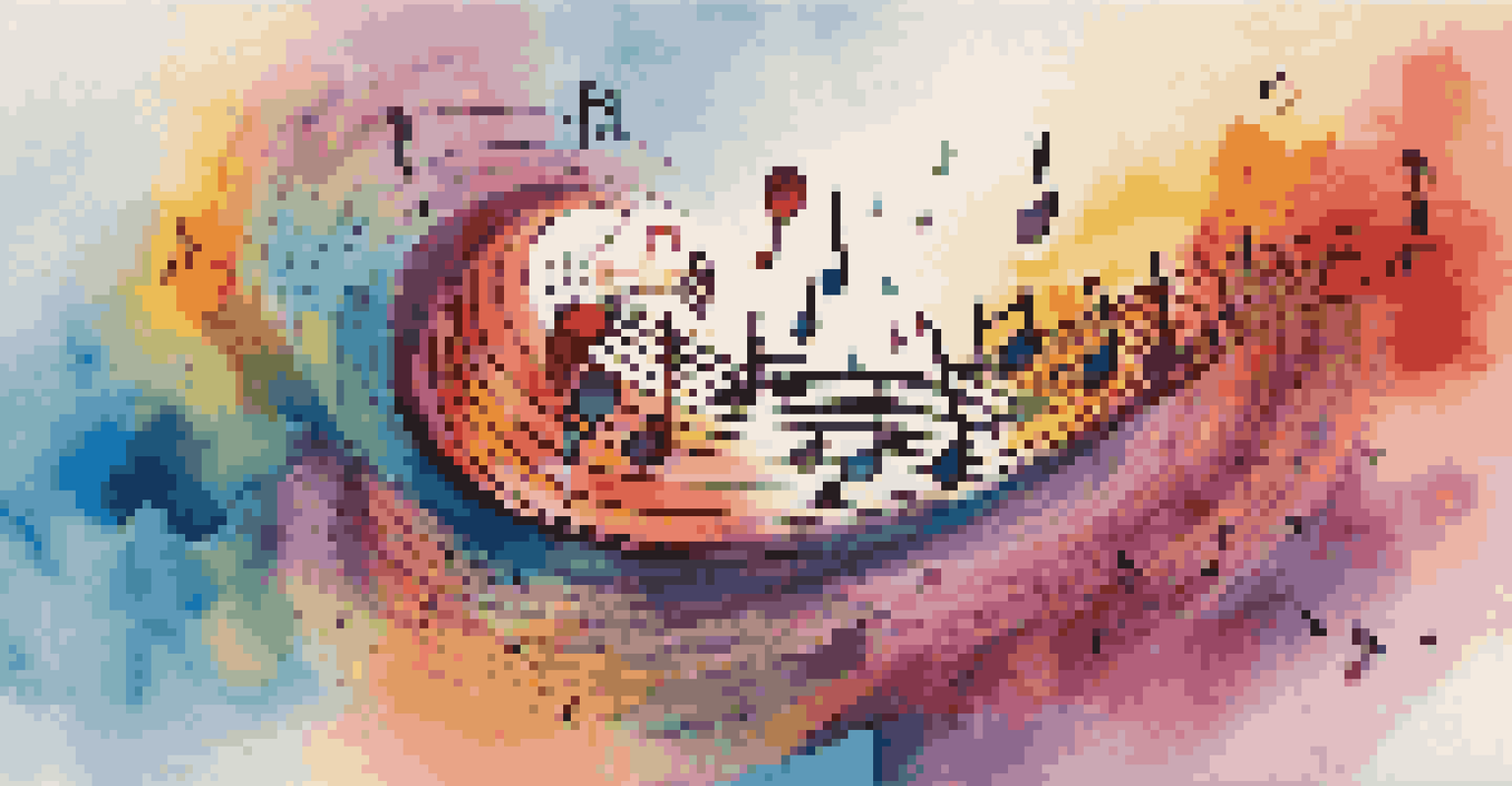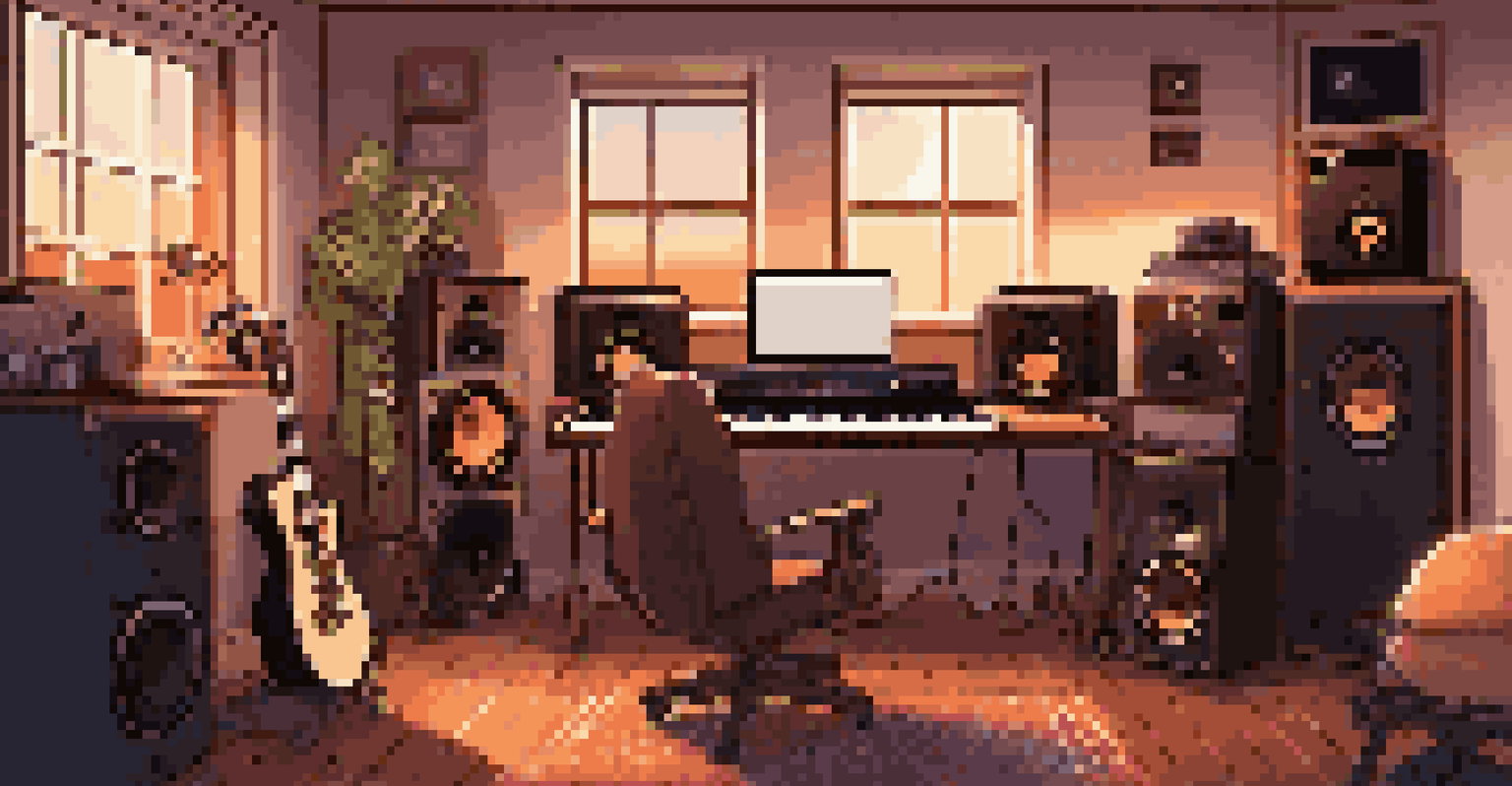Generative Music: An Artistic Exploration of AI's Potential

What is Generative Music and Why Does It Matter?
Generative music refers to music created through algorithms, often with minimal human intervention. It represents a blend of technology and creativity, pushing the boundaries of traditional music-making. As AI continues to evolve, its ability to compose and generate unique soundscapes has become not just possible but increasingly popular.
Music is the shorthand of emotion.
This form of music challenges our understanding of authorship and creativity. If a computer can create a piece of music, who is the real artist? This raises fascinating questions about the nature of art and the role of technology in our lives.
Moreover, generative music opens up exciting opportunities for musicians and producers. By using AI tools, they can explore new genres, create ambient soundscapes, or even collaborate with algorithms to inspire their own compositions.
The Evolution of Music Creation with AI
The journey of generative music began with simple algorithms, but it has advanced significantly. In the early days, artists like Brian Eno experimented with tape loops and chance operations, laying the groundwork for what would come next. Today, AI can analyze vast amounts of data to create complex compositions that resonate with listeners.

This evolution has also democratized music creation. Now, anyone with a computer can access sophisticated tools that were once reserved for professional studios. With user-friendly software, aspiring musicians can experiment with generative techniques without needing extensive training.
Generative Music Blends Tech and Art
Generative music combines algorithms and creativity, challenging traditional notions of authorship and expanding opportunities for musicians.
AI's ability to learn from existing music styles means that it can not only mimic genres but also innovate new ones. This fusion of human creativity and machine learning is paving the way for a new era in music, where collaboration between man and machine becomes the norm.
The Role of Machine Learning in Music Generation
Machine learning, a subset of AI, plays a crucial role in generative music. By analyzing patterns in existing music, algorithms can learn to create original compositions that maintain a certain style or emotional quality. This process often involves training models on large datasets, enabling them to recognize musical structures and dynamics.
The future belongs to those who believe in the beauty of their dreams.
For example, Google's Magenta project uses machine learning to generate melodies and harmonies that can inspire human artists. These tools demonstrate how AI can supplement human creativity, offering new ideas and perspectives that artists might not have considered.
However, it's essential to understand that machine learning isn't about replacing musicians. Instead, it serves as a collaborator, providing artists with fresh material and prompting them to explore uncharted musical territories.
Exploring the Creative Process with Generative Tools
Generative music tools can significantly alter an artist's creative process. Instead of starting from scratch, musicians can input parameters and let the AI generate a base composition. This can be liberating, allowing artists to focus on refining and personalizing the output rather than getting bogged down in initial creation.
For instance, software like Ableton Live integrates generative tools that enable artists to manipulate sounds in real-time, leading to spontaneous and unique performances. This shift encourages experimentation and can result in unexpected musical outcomes that surprise both the artist and the audience.
AI Transforms Music Creation Process
AI tools democratize music creation, allowing anyone to experiment with generative techniques and collaborate with algorithms.
As musicians explore these new tools, they often find themselves in a dialogue with the AI, continuously adjusting and interacting with the generated music. This iterative process can lead to the development of an entirely new sound, one that fuses human intuition with algorithmic precision.
The Impact of Generative Music on the Industry
The rise of generative music is reshaping the music industry in profound ways. Artists are leveraging AI to produce tracks more efficiently, which can lead to a higher volume of releases. This shift not only benefits individual artists but also impacts record labels and streaming platforms that thrive on new content.
Moreover, generative music has found a niche in various applications, from film scores to video game soundtracks. Composers are using AI to create dynamic soundtracks that adapt to changing scenes, enhancing the viewer's experience. This adaptability is a game-changer in how we think about music in multimedia contexts.
However, the industry's embrace of AI-generated music does raise questions about the future of traditional musicianship. As AI becomes more prevalent, it's crucial to find a balance between utilizing technology and preserving the artistry that has defined music for centuries.
Ethical Considerations in AI Music Creation
As with any technology, the rise of generative music brings ethical considerations to the forefront. Issues surrounding copyright and ownership are particularly complex. If an AI generates a piece of music, who owns the rights? Is it the programmer, the user, or the AI itself? These questions are prompting discussions about intellectual property in the digital age.
Additionally, there is concern about the potential for AI to perpetuate biases present in the datasets it learns from. If the training data lacks diversity, the music generated may reflect those limitations, leading to a homogenization of sound. This underscores the importance of curating diverse datasets to ensure that the music landscape remains rich and varied.
Ethics and Future of AI in Music
The rise of generative music raises ethical questions about ownership, bias in datasets, and the emotional depth of human artistry.
Lastly, there’s the human element to consider. As artists increasingly rely on AI, there's a risk of diminishing the emotional depth that comes from human experience. Finding ways to integrate AI while retaining the emotional authenticity of music is a challenge that artists and technologists must navigate together.
The Future of Generative Music and Art
Looking ahead, generative music is poised to become an integral part of the artistic landscape. As technology continues to advance, we can expect even more sophisticated tools that enhance the creative process. This evolution will likely lead to new genres and styles that we can't yet imagine.
Furthermore, the collaborative potential between humans and AI is vast. Artists might not only use AI to generate music but also to create visual art, literature, and more, resulting in multi-sensory experiences that engage audiences on multiple levels. The fusion of these creative disciplines could redefine what it means to be an artist in the 21st century.

Ultimately, the future of generative music lies in its ability to inspire and innovate. By embracing the capabilities of AI while honoring the essence of human creativity, we can look forward to a vibrant musical landscape that reflects the complexities of our world.